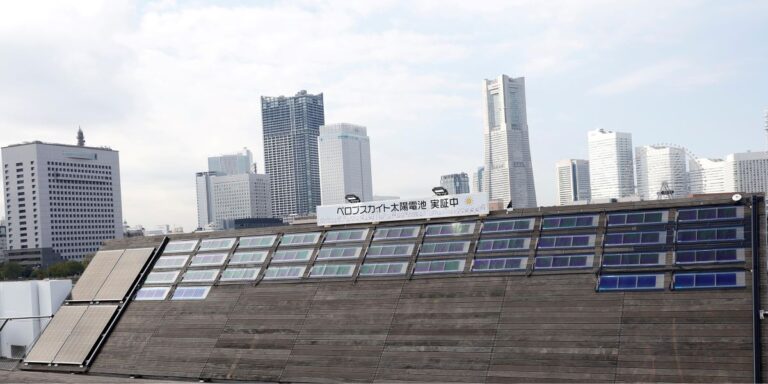Three Japanese technology companies test the sustainability and performance of lightweight, flexible perovskite solar modules on a pier in Yokohama City. It is part of a larger three -year research project since the end of 2023.
A Japanese consortium tests the durability and performance of lightweight, flexible perovskiet solar modules in Osanbashi Pier, Yokohama City in windy and salt-air conditions. The open-air test is part of a larger 3-year collaboration between Perovskite Solar Technology Research.
The three -month 1 KW Perovskite Solar Module Trial on Osanbashi Pier started in November 2024. Three companies established in Japan take part in the outside of the outside air: Macnica, a supplier of technology and electronics, Reiko, a thin film product manufacturer and manufacturer of one Film product and a thin film product manufacturer and cell specialist Peccell Technologies, which was founded in 2004 as a Toin University of Yokohama spin-off by Perovskiet Solar Pioneer Tsutomu Miyasaka.
Miyasaka, whose academic career extends from the Toin University of Yokohama to the University of Tokyo, is the accompanying author of the widespread paper “Organo metal Halogenide Perovskites as visible light sensitivity to photovoltaic cells‘It was published in the Journal of the American Chemical Society In 2009 and described the first attempts to design PV technologies based on leadhalide -perovskites.
“The Osanbashi Pier test installation has 80 panels of 30 cm x 1 m each,” said Miyasaka PV -MagazineNote that the modules have a power conversion efficiency of 10% and are manufactured in a roll-to-roll process with indium tinoxide on plastic (ITO-PET) films. “We use a module based on ITO-PET films with a thickness of 125 μm and low plate resistance of 12 OHM/M2,” he added and noted that Peccell is working simultaneously on modules with higher efficiency and greater durability.
The modules are installed in order to enable comparative verifications. Testing will also verify encapsulating and film duration. In addition, a new mounting system has been developed to make it easier attachment/detachment to simplify the replacement of PV modules in the field.
The three -year -old Perovskite Solar Technology Development and Demonstration Initiative started in 2023 in Yokohama and is accompanied by Miyasaka himself. The initiative is supported by the Japanese Ministry of Environment (Meti).
Other projects within the initiative will test the use of Perovskiet solar panels on wavy, golf costs roofs and a third project will test the panels on structures for light frames, such as tents or polytunnel type greenhouses. The goal efficiency of the perovskiet panels is 20% and the purpose of the Service State is 15 years.
The aim is to make solar energy generation possible on the 90% of the roofs in Japan that cannot install conventional heavy silicon solar panels, and to dispose of the energy consumption of marine port terminals, ships and trucks
This content is protected by copyright and may not be reused. If you want to work with us and reuse part of our content, please contact: editors@pv-magazine.com.


